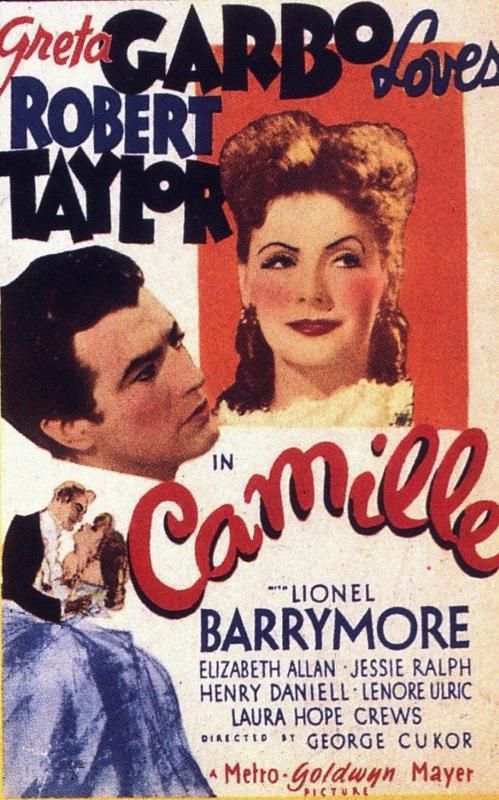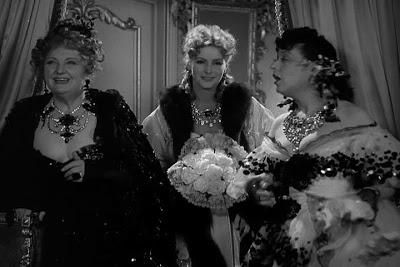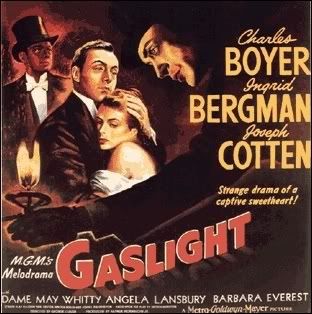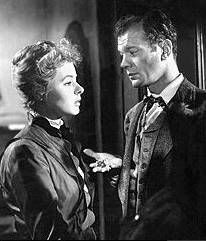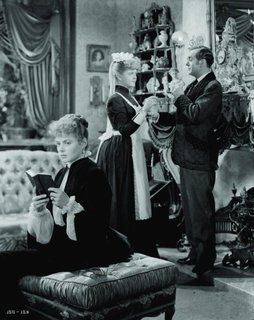Camille
1936
Director: Geoge Cukor
Starring: Greta Garbo, Robert Taylor, Henry
Daniell
I’m
going to show my hand awfully early in this review and come right out and say I
can’t be bothered to give two shits about this movie. Camille is certainly not a bad film,
but jesus christ, I don’t care. I don’t
care in the slightest.
Setting
the standards for all future Nicholas Sparks novels, Camille tells the story
of Marguerite (Garbo), a beautiful but sickly Parisian socialite/courtesan who
gets through life by charming the pants and money out of men. One night at the theater, she meets two new
men. Duval (Daniell) is wealthy but
pompous. Armand (Taylor) is poor but
kind. Guess which one she falls for,
guess which one gets jealous and dangerous, and guess what her insistent
coughing eventually means. You guessed,
good for you, get a cookie.
I
know that this is a classic romance, and I know that to many people, Camille
is desperately romantic. I love
romances, I do, and I definitely have the occasional mood where I want to do
nothing but watch costume dramas for three days straight, but my taste in such
films is not quite typical. I find Camille
so terrifically melodramatic, so soppy, so utterly predictable, and yet so
tepid, that I just don’t care. It
reminds me of one of my favorite lines from Gilmore
Girls, when Lorelai, commenting on Luke’s insensitivity about something or
other, says, “This from the man who said ‘Finally!’ at the end of Love
Story.” That’s me; I am that
person who says “Finally!” at the end of any kind of predictable shmoopy weepy romance. It’s kind of sad, but I actually got excited
when Marguerite (nicknamed Camille because of her love of the camellia flower)
started coughing and getting markedly weaker, because that means the end can’t
be too far away.
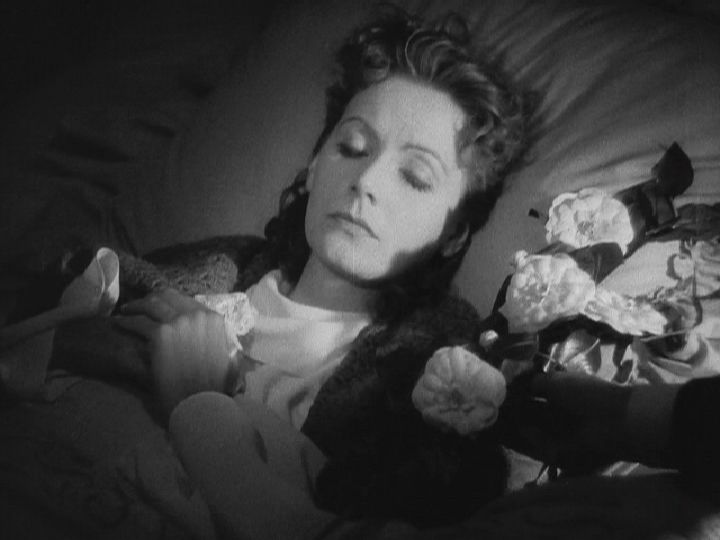 |
| Yay! |
The
dialogue is inane. Such ridiculous
platitudes of love; if my husband started spewing this kind of flowery language
at me, I’d think he was high on meth or something. The soundtrack during these ridiculous
exchanges just makes them even more over the top, full of glissando strings
that whine and cry and just make everything worse. Yes, this was the style of the time, but it
doesn’t help me believe the stupidity being spoken. And not helping things along is the fact that
I don’t believe a single word out of any of the characters’ mouths. There is so much fake sincerity in this film,
it’s painful. A part of the reason for
this is the world that Marguerite inhabits at the beginning of the film is
built on such insincerity. We spend at
least half an hour ensconced in this world of frills and frosting and fake
declarations. We see Marguerite roll her
eyes at Armand – yes, roll her eyes – when he tells her pretty much right away
that he loves her. We see her laugh and
giggle and purposely lead on Duval. We
see her friends who, amazingly enough, are twice as bad as she is. So I have trouble buying the transition from
superficiality to honest to god emotion.
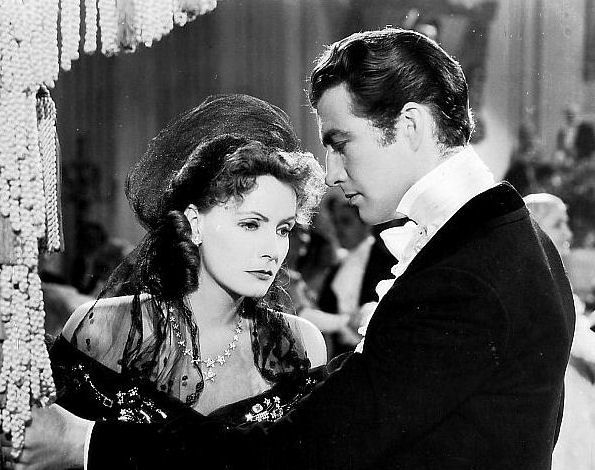 |
| I feel the same way, Greta. I feel the same way. |
At
this point, I’ll say again that I do actually enjoy romances. What I need in order to enjoy a romance is
some sort of spark or heat; chemistry, in other words. I want to feel that feeling in my stomach,
that feeling of the thrill of romance, of excitement. My favorite romances make me feel this way,
and I never felt a single jolt of this with Camille. Not one iota of chemistry or excitement or
that spark in my stomach. No tension, no
fun, no nothing. Just pure tedium
watching the wholly expected story play out in front of me.
My
favorite part of the film – yes, I did have one, amazingly enough – was the
costumes. The gowns are gorgeous, even when
shot in black and white. There is such
elegance, such luxury, and, when necessary, such ridiculous excesses (a bird
dress makes an appearance at one point) that it’s quite a marvel. I couldn’t get enough of Garbo in a clean
white satin off-shouldered gown. It was
absolutely stunning. Next scene, she’s
swathed in black sequins and lace, and again, stunning. If nothing else, I enjoyed watching everyone
in this movie, even if the story and dialogue and characterization was more
than a little wanting. Maybe if I have
to watch this in the future I’ll just put it on mute.
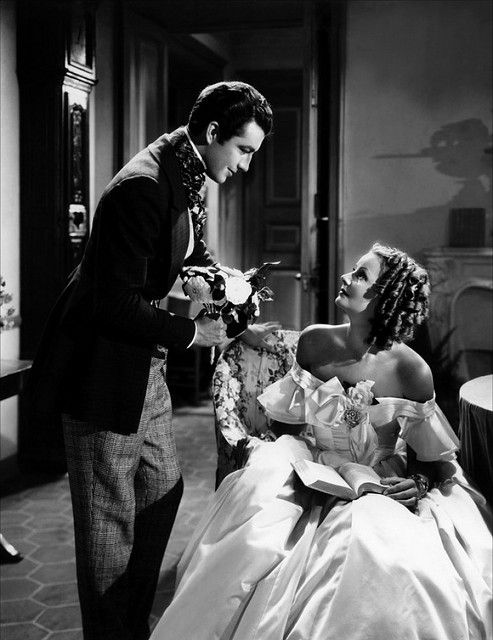 |
| This gown was my favorite. |
I
know this is a classic Greta Garbo performance, and I suppose she does a good
job. I just… don’t care. You could have the finest performance in the
world, but if it’s as the tragic romantic heroine of the latest Nicholas Sparks
adaptation, I’ll avoid it like the plague.
I
don’t know what else to write. I’m
coming up a few hundred words short on this particular film, but I don’t
care. I can’t think of anything else to
say. So utterly and completely not for
me, yet at the end of the day, I recognize why many enjoy this kind of
“romantic” escapism. Despite me railing
against it here, I know that this is mostly due to my personal taste in
romance. Really, Camille is a perfectly
acceptable film. It’s just not for me.
Arbitrary
Rating: 5/10. I don’t care.
